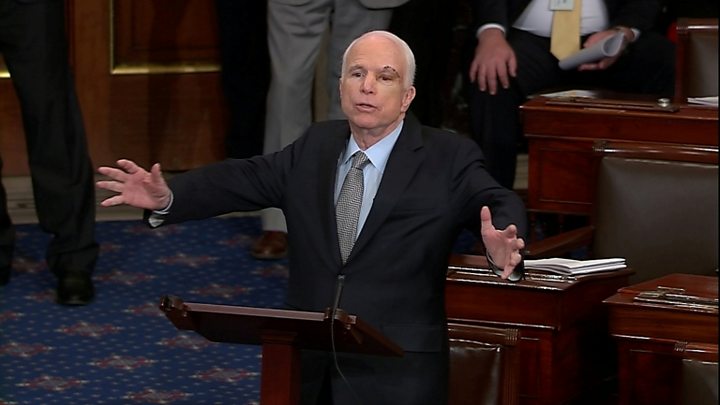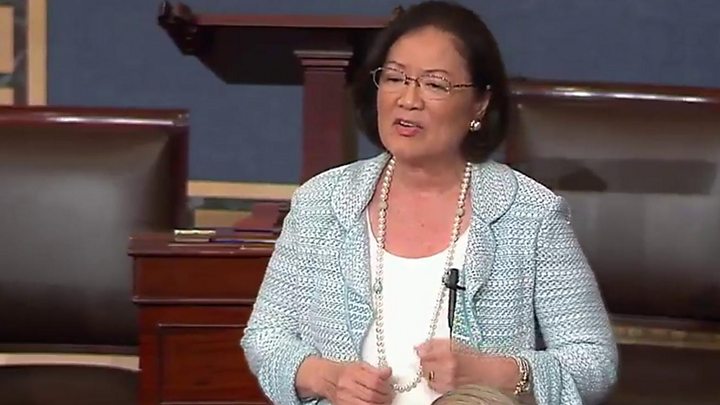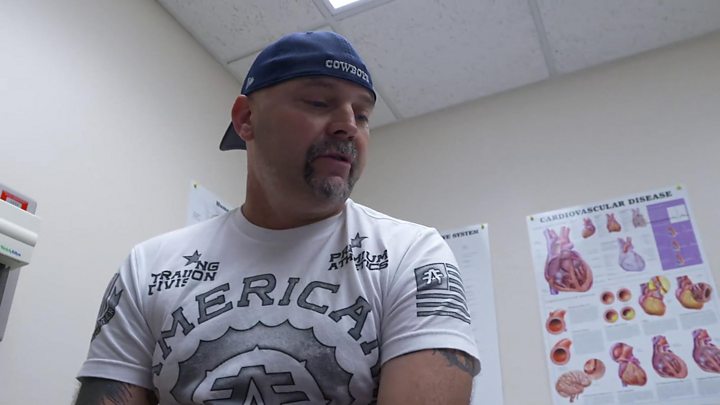Where Trump went wrong on healthcare

Hollywood script-writers couldn't have staged it any better.
At roughly 1:30 on Friday morning, John McCain approached the dais on the floor of the Senate. Votes on the latest Republican healthcare reform plan had mostly been recorded, and it was clear that the Arizona senator would be the difference between success and failure.
Mr McCain held his right arm out, palm down. It was his good arm, the one not crippled by the plane crash in Vietnam that left him a prisoner of war for more than five years.
After a pause he turned his hand, like a Roman emperor passing judgement at a gladiator match, and pointed his thumb toward the ground.
"No," he said, amid gasps and a smattering of applause by stunned - and jubilant - Democrats.
For the first time in a long while, politics in Washington weren't at Veep-level absurdity or House of Cards intrigue. It was high drama, with a decorated hero playing the leading role.

Off to one side, New York Senator Chuck Schumer - leader of the Senate Democrats - waved for his side to stay calm. The enormity of Mr McCain's move was obvious, but he didn't want his party to be accused of gloating.
The look in Senate Majority Leader Mitch McConnell's eyes, and the catch in his throat as he spoke after the gavel sounded the bill's death knell, said it all, however.
This wasn't just a glancing blow - a temporary setback for reform efforts akin to the countless others that had occurred during the Obamacare repeal's winding legislative course.
When Mr McCain lowered his thumb in the early hours of Friday, he was signalling the downward spiral of the president's legislative agenda.
He was effectively passing judgement on the process and practice of this nascent administration. In a speech a few days earlier, he had criticised Washington in general and those who flout congressional traditions, but the message was clearly directed at the man sitting in the Oval Office.
As he left the Senate after defeat of a bill he had voted for, Richard Burr, a Republican from North Carolina, was asked by a reporter what the next step is.
"There is no next step," he snapped.

In the hours after the bill died, social media buzzed with criticisms of how the Trump administration handled - or, rather, mishandled - the legislative push.
Maybe Interior Secretary Ryan Zinke shouldn't have threatened Alaska Senator Lisa Murkowski - an early no vote - with political retribution and cuts to federal funding to her home state.
The senator had won re-election in 2010 as an independent write-in candidate after losing to a grass-roots conservative in the Republican primary. She was probably immune to angry Trump tweets or warnings of populist uprisings among her base.
Maybe Susan Collins of Maine, the lone Republican to vote against Obamacare repeal back in 2015 when it was a symbolic effort, should have been brought into Senate legislative negotiations from the beginning, rather than shrugged off as an unneeded vote.
Perhaps Mr Trump's tweet that Mr McCain was an American hero when he flew to Washington after brain surgery to vote on the healthcare bill wasn't enough to outweigh the time, two years ago, when candidate Trump questioned the Arizona senator's military heroism.
In the end the White House's "closing arguments" for the Senate bill - a smattering of presidential tweets, a staged "victims of Obamacare" event and some last-minute lobbying by vice-president Mike Pence - weren't enough. Not nearly enough.
Instead of beating the drum for healthcare reform, the administration had been all over the map.
A hastily announced ban on transgender individuals in the armed forces, issued by presidential tweet. A press conference to herald efforts to combat gang violence. A campaign-style rally in Ohio with a focus on the threats of illegal immigration. A speech to a Boy Scouts gathering that was heavy on media bashing.
In case that wasn't enough, over the past week the administration has been beset by internecine warfare. Mr Trump publicly questioned the effectiveness of his former campaign confidant, Attorney General Jeff Sessions, subjecting him to an increasingly angry barrage of tweets.
Mr Trump's newly installed communications director, Anthony Scaramucci, spent most of his time communicating his differences with White House chief-of-staff Reince Priebus and other presidential aides in particularly colourful language.
The president, we are told, thrives on chaos. As Mr Scaramucci likes to say, Mr Trump is a disruptor, sent to Washington to shake up the establishment.
The disruption, however, is coming with a price.
Although healthcare reform could always crawl its way out of the grave, that seems unlikely anytime soon.

The Senate has to move on to more pressing business - passing appropriations to keep the government running, raising the debt ceiling, and confirming the backlog of Trump's administrative and judicial appointments.
Then there are the other Republican legislative priorities, tax reform in particular. The longer the party tilts at the healthcare windmill, the more unlikely any serious effort can be mounted before legislators have to turn their focus to re-election in the 2018 congressional mid-terms in November.
Any talk of new legislative goals or efforts is of questionable utility, however, if the Trump White House doesn't learn some hard lessons from this recent failure.
Stay focused and on message. Build relationships with sometimes prickly members of Congress. Don't assume that a president with approval ratings in the high 30s can bully recalcitrant opponents.
On Friday morning Mr Trump tweeted about doing away with the legislative filibuster in the Senate, which requires 60 votes for the passage of major bills. On Friday morning, however, his party couldn't get to 50 with its bare-minimum "skinny" bill.
Losers gripe about the rules of the game. Winners find a way to prevail.
So far, winning for the Trump administration has been in short supply.

